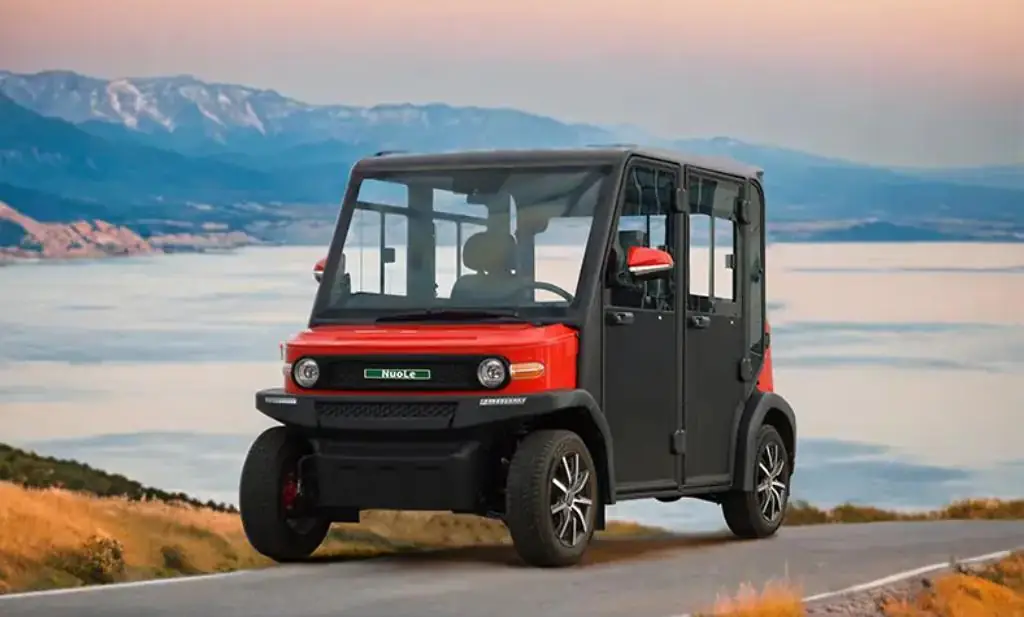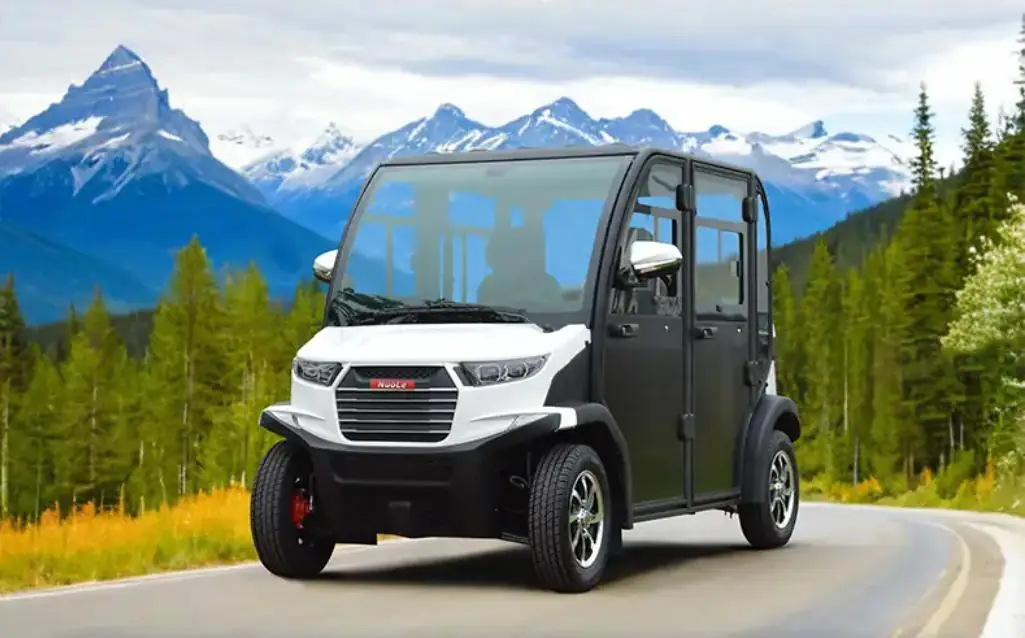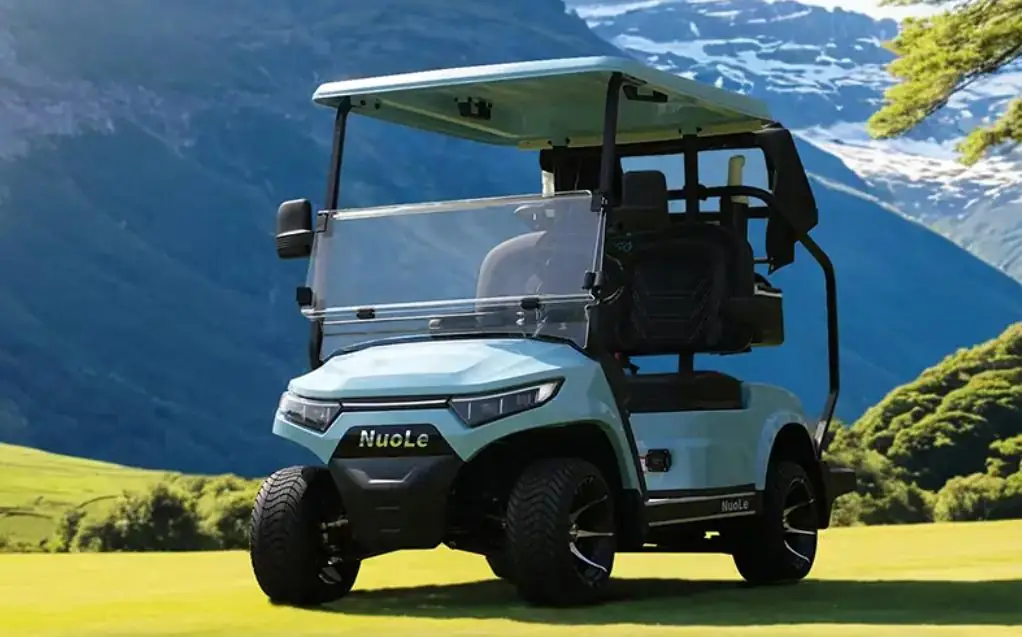Golf carts are now used in various settings beyond traditional golf courses. Today, they are increasingly used in neighborhoods, resorts, retirement communities, and even city streets. As their popularity grows, one question often comes up: are golf carts legal on the street? The answer depends on where you live, as street legality differs from region to region.
This article explains the key rules that define whether a golf cart can be used on the street, what safety standards must be met, and how local laws vary across regions.
Product shown: NL-S4.DC Street Legal Golf Cart
An Overview: Are Golf Carts Legal on the Street?
Street legality is determined by a hierarchical structure of laws: the Federal Motor Vehicle Safety Standard No. 500 (FMVSS 500) defines the vehicle classification for low-speed vehicles, while state legislatures regulate their road access, and local municipalities often impose the final, most stringent restrictions on operation.
The operational legality of LSVs and golf carts varies widely, making compliance a hyper-local effort. States generally fall into three categories:
- Outright Bans: Some states maintain a complete statewide ban on standard golf carts operating on public roads. This restrictive category includes Alabama, Delaware, Oregon, and Hawaii.
- Locally Determined Legality: States such as Illinois, Nebraska, Nevada, Wisconsin, and Kansas ban operation at the state level but allow local municipalities to create exceptions through specific ordinances.
- Permissive Frameworks: These states actively legislate for golf cart and LSV use.
Examples of State and Local Regulations:
* Basically, if you turn your golf cart into an LSV and get it registered, you’ll be able to go faster and drive on more roads.
| State Example | Allowed Road Speed Limit | Minimum Driver Age (Standard Cart) | Licensing Requirement (LSV) | Unique Restriction/Note |
| Florida (FL) | ≤35 mph (LSVs); ≤30 mph (Carts) | 14 years old (Carts) | Valid license required for LSVs | LSVs require mandatory minimum PIP/PDL insurance ($10k/$10k) |
| South Carolina (SC) | ≤35 mph | 16 years old with valid license | Required | Cart must remain within 4 miles of registered address; Daylight operation only (unless equipped) |
| Georgia (GA) | ≤35 mph (Cart speed limit: 20 mph) | 15-16 (Varies by permit/accompaniment) | Varies, license required for LSV tag | Local path systems often override state rules |
| Arizona | ≤35 mph | Standard driving age (16+) | Valid license mandatory for LSVs | LSVs are permitted on public roads provided the driver holds a valid license |
What Makes a Golf Cart Street Legal? Key Factors
So, what makes a golf cart street legal or illegal? Let’s see:
- Speed Capabilities
A major consideration in determining whether a golf cart can be driven on public roads is its maximum speed. Federal guidelines define a “low-speed vehicle” (LSV) as one that operates above 20 mph but not more than 25 mph.
Many states will allow LSVs on roads with posted limits up to 35 mph, while traditional golf carts with lower speed ratings generally face stricter restrictions. For instance, in California, only carts that qualify as LSVs and meet the state’s registration and equipment standards are permitted to use public streets marked at 35 mph or below.
Product shown: NL-S4.DB Street Legal Golf Cart
- Safety Equipment Requirements
When a golf cart is intended for street use, adhering to the required safety equipment becomes essential. LSVs must comply with federal safety standard FMVSS 500, which covers elements as listed below.
| Component | Federal Requirement (FMVSS 500) | Function/Purpose |
| Speed | Maximum 25 mph | Compliance with LSV classification |
| Lights | Headlights, Taillights, Stop Lamps, Front/Rear Turn Signals | Visibility and signaling intent |
| Windshield | DOT-approved, shatter-resistant material | Occupant safety and visibility |
| Mirrors | Driver’s side exterior + Passenger side or interior | Rear visibility for safe operation |
| Seat Belts | Type 1 or Type 2 assembly at every seating position | Occupant restraint (prevents incidents) |
| Horn | Required, audible from 200 feet | Alert system |
| Technical | Parking Brake, Speedometer, Red Reflectors, VIN Plate | Control, monitoring, identification, registration |
- Licensing and Registration
Street-legal carts are often treated like other motor vehicles, meaning titles, registration, insurance, and driver licensing may be required.
On the other hand, golf carts that stay under a given speed threshold and operate only on permitted roads may be exempt from full motor vehicle registration.
- Age Restrictions for Drivers
States set minimum operator ages and may require a driver’s license depending on the vehicle type and where it is driven. For example, in Florida, the minimum age to operate on designated public roadways is 14 years old. If the cart is registered as an LSV and driven on public streets, though, a valid driver’s license is required.
In Georgia, you need to be at least 16 and have a driver’s license to operate a golf cart on public roads. Fifteen-year-olds can use a learner’s permit only when a licensed adult rides along.
- Road Types Allowed
Access is usually restricted to slower roads and specific areas. Most LSVs are allowed on public roads with speed limits of 35 mph or lower, such as in Florida and Arizona. Locally permitted golf carts usually face tighter restrictions, typically limited to streets with 25 mph or lower, like in California and Georgia.
Golf carts and LSVs are not allowed on federal highways, interstates, or other high-speed roads. Some states, for example South Carolina, also set time-based limits, allowing operation only during daylight hours unless the vehicle has the proper FMVSS-compliant lighting for night driving.
Nuole Recommendation
Nuole is a renowned manufacturer of the best street-legal golf carts designed according to your specific needs. Our street-legal models include essential features such as headlights, turn signals, mirrors, and strong braking systems, making them suitable for local roads and residential communities.
We offer OEM and ODM customization, allowing you to adjust elements like seating layouts, colors, and battery configurations according to regional requirements.
With a strong production capacity and reliable after-sales support, Nuole has earned recognition in global markets for delivering dependable, well-crafted electric golf carts that meet modern mobility standards.
Wrapping Up
As golf carts continue to gain popularity beyond the fairway, choosing the right street-legal model becomes essential for comfort, safety, and long-term value. Nuole makes that choice easier by offering electric golf carts that combine advanced performance with reliable craftsmanship.
With customizable options, strong engineering, and a commitment to global standards, we help individuals, resorts, and communities enjoy efficient and stylish mobility solutions. Learn more about our services—contact us today!
References:




